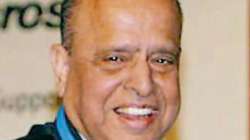Kasturirangan says no efforts to impose Hindi
Former ISRO chief K Kasturirangan, who heads a panel on new National Education Policy, clarified that there were no efforts to impose Hindi even as he dismissed reports of dissent against the removal of the Hindi clause.

Former ISRO chief K Kasturirangan, who heads a panel on new National Education Policy, clarified that there were no efforts to impose Hindi even as he dismissed reports of dissent against the removal of the Hindi clause.
Political parties, especially in the state of Tamil Nadu, had strongly opposed the three-language formula proposed in the draft National Education Policy (NEP) alleging that it was tantamount to thrusting Hindi language on non-Hindi speaking states.
Kasturirangan asserted that there was never an attempt to impose Hindi. "We had two approved versions where one of them did not convey the spirit of the language policy as we wanted to give. We replaced it with the para that does not mention Hindi," he said.
"There was never an intention to impose Hindi. The main difference between the education policy of 1968, 1986, 1992 and the present one is that the three-language formula is acceptable in the earlier ones, but there is flexibility in the new policy," the scientist added.
Revising the draft education policy, the Centre dropped the contentious provision of compulsory teaching of Hindi in non-Hindi speaking states after the three-language proposal sparked outrage.
The revised draft of the NEP says, "Students who wish to change one or more of the three languages they are studying may do so in Grade 6 or Grade 7, so long as they are able to still demonstrate proficiency in three languages (one language at the literature level) in their modular Board Examinations some time during secondary school."
In the earlier draft, the panel had proposed mandatory teaching of Hindi in non-Hindi speaking states.
"Students who wish to change one of the three languages they are studying may do so in Grade 6, so long as the study of three languages by students in the Hindi-speaking states would continue to include Hindi and English and one of the modern Indian languages from other parts of India, while the study of languages by students in the non-Hindi-speaking states would include the regional language, Hindi and English," the earlier draft policy said.
The ex-ISRO chief said both the paragraphs were approved by the committee and it was felt that the revised para conveyed the flexibility of the three-language formula in a better way. "Here is a paragraph that was approved as part of the formulation of the policy and it could convey the spirit of the language policy than the paragraph we had put in the earlier one. Both were discussed and approved," he told PTI.
There were also reports that two members of the committee tasked to draft the NEP -- K M Tripathy and Ram Shankar Kureel -- disagreed with the dropping of the clause.
"When you conduct meetings over a period of one and a half years, there will be disagreements. It is a part and parcel of discussion. If you want to highlight one thing, I feel it is not right. All the decisions have the committee's endorsement," Kasturirangan added.
Also Read | Karunanidhi lives, says Stalin after Hindi clause is removed from National Education Policy draft